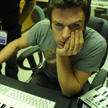Photo by Fred Hayes
Nate von Zumwalt
An effective film score moves seamlessly with a film’s images, imitating the ebb and flow of a film’s tone, or offering a restless, vibrant counterpoint to it. We usually think that a film score goes about its job without thrusting itself to the forefront—except for when it does, and even then, it’s still augmenting the story, involving the viewer more deeply in the experience of a film.
But music can often be overlooked at a film festival. Sundance Institute has long championed the role of the composer and his or her contribution to the collaborative art of filmmaking. The Sundance Film Festival recognizes the enormous role film music plays by hosting events during the Festival such as the Sunday night panel, A Celebration of Music in Film, and the daily ASCAP Music Cafe, and by spotlighting the multitude of talented composers featured in each year’s films.
In fact, four Sundance Institute Composers Lab alumni will have their work on display at the 2011 Festival, an accomplishment Film Music Program Director Peter Golub says reflects their ability to “extend their work at the lab into a professional context.” Gingger Shankar (Circumstance), iZLER (On The Ice), Vivek Maddala (Kaboom), and T. Griffin (Pandemic 41.410806, -75.654259) have each attended a summer Composers Lab where they collaborated with filmmakers to gain first-hand experience composing for film.
Golub has worked personally with each of this year’s Festival crop of composers at the Labs and continues to guide them in their careers. “These four composers, who were all amazingly accomplished before their time at the Lab, have had a chance to apply what they learned in the Lab setting as they make their way in film scoring,” he says.
One of them is Czech-born composer iZLER, who possesses an array of instrumental talents which have guided a seamless transition to film music. An expert guitarist and bass player, iZLER released a solo album in 2003 after an extended stint with the Robbie Williams band. He arrives at the 2011 Festival for the first time having composed the score for U.S. Dramatic Competition film On the Ice.
Another U.S. Dramatic Competition entry, Circumstance, marks composer Gingger Shankar’s return to the Festival. Having initially appeared in Park City for the New Frontier section of the 2009 Festival, the singer/composer/violin virtuoso is primed to return to the rich musical atmosphere at the Festival.
“You have a chance to hear incredible artists at some of the most intimate venues,” says Shankar of the Festival’s musical lineup. “I remember seeing Mos Def perform Fats Waller tunes a few years back with Jean-Michel Bernard and Michel Gondry in an art space. It was one of the best concerts I have ever been to.”
It’s this meshing of offscreen music festivities with the “wide range of films with an incredibly rich and diverse body of scores” that make for a memorable film music environment, according to Golub. Shankar met director Maryam Keshavarz at the 2007 Composers Lab and Circumstance is the product of that enduring relationship. “She was so brave with the film that she made it easy to take risks musically,” says Shankar. “The score is so diverse and interesting. We go from traditional score to punk to hip hop to classical Iranian music, and more.”
Vivek Maddala is a 2008 Composers Lab alum and multi-instrumental performer whose composition for Kaboom marks his debut at the Festival. Maddala, however, is no stranger to Park City, as three of his film scores have received awards at the 2008 and 2009 Park City Film Music Festivals (Grasshopper; Wild Oranges; They Turned Our Desert Into Fire).
His poignant orchestrations embody the emotion and atmosphere that play a fundamental role in film music. Another 2008 Composers Lab alum, T. Griffin, returns to the Festival this year having composed the score for Lance Weiler’s short film Pandemic 41.410806, -75.654259. Griffin was previously featured at the 2009 Festival for his original music in dramatic feature Children of Invention.
Each of these composers offers a unique musical perspective and capitalizes on the powerful role music can play in film, but their Composers Lab experiences helped usher them from the private, fragile moment when their compositions were created and honed to the much more public exhibition of their work in film screenings throughout the Festival.
Their scores may echo a film’s images, or they may provide a striking contrast to them. Golub is well-versed in the various shadings of film music. “It can enhance what’s going on,” he says, “provide a counterpoint by bringing out an emotion that isn’t on the screen. It can turn our focus to a particular character, or create an atmosphere.”




